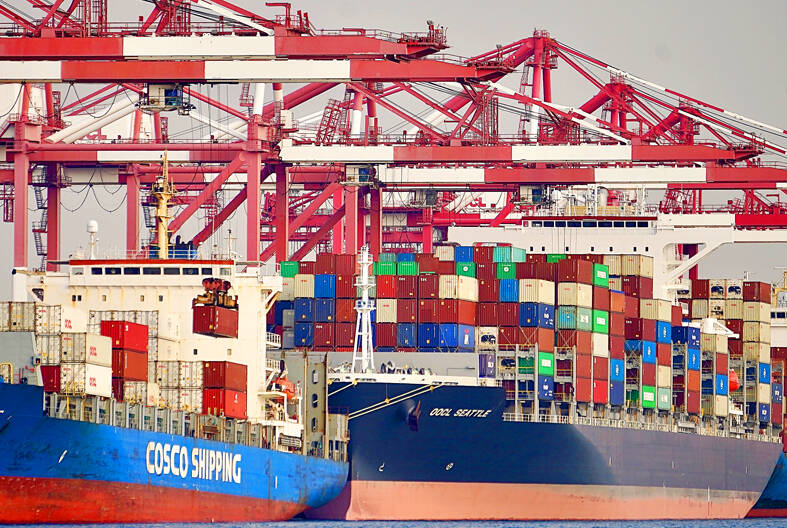Taiwan’s export-oriented economy is expected to grow by less than 3 percent this year, as heavier-than-expected “reciprocal” US tariffs of 32 percent are to deal a blow to the nation’s manufacturing sector and exports, analysts and economists said.
Taiwan’s first-order impact could be significant, as its reciprocal tariff rate is unexpectedly high at 32 percent, DBS Group Holdings Ltd economist Ma Tieying (馬鐵英) said in a report yesterday.
That is above the Asian average of 28 percent and the overall average of 29 percent across the 60 affected nations, Ma said.

Photo: CNA
The second-order impact further exacerbates Taiwan’s vulnerability, she added.
“We foresee significant downside risks to our GDP growth forecasts for 2025 and 2026, currently projected at 3 percent and 2.4 percent, with particular concern from the 2026 outlook,” Ma said in the report. “Taiwan’s vulnerability stems from its high exposures to the US export market.”
Taiwan’s exports to the US last year accounted for 23 percent of total exports and 14 percent of nominal GDP, making the nation the second-most vulnerable economy in Asia to the first-order impact of reciprocal tariffs, just behind Vietnam, the report said.
As Taiwan’s GDP is highly dependent on exports for growth, the second-order impacts on Taiwan could also be significant, as the US and global economy are at risk of recession, with shrinking trade volumes in major economies such as the US, China, Japan and Europe.
Exports accounted for 63 percent of Taiwan’s nominal GDP last year, the fifth-highest level in Asia.
“This high dependence on exports makes Taiwan particularly vulnerable to a global economic downturn,” Ma said.
By segment, the electronics, plastics and textile sectors would be affected the most by the tariffs, as semiconductor, steel and pharmaceuticals imports to the US are tentatively spared from the duty, Yuanta Securities Investment Consulting Co (元大投顧) said in a report on Thursday.
“If all the tariffs take effect as scheduled, Taiwan’s economic growth this year will be less than 3 percent,” the investment consultancy said.
The estimate includes indirect impact from the decline in global trade and the economy.
Yuanta expects US tariffs to reduce GDP growth by 0.8 percentage points directly and 0.24 percentage points indirectly from its original forecast.
Taiwan’s GDP could grow just 2 percent on an annual basis this year, as the US tariffs would weaken exports, Cathay Securities Corp (國泰證券) said in a separate report on Thursday.
That would be significantly lower than the 3.14 percent growth forecast by the Directorate-General of Budget, Accounting and Statistics in February.

Sweeping policy changes under US Secretary of Health and Human Services Robert F. Kennedy Jr are having a chilling effect on vaccine makers as anti-vaccine rhetoric has turned into concrete changes in inoculation schedules and recommendations, investors and executives said. The administration of US President Donald Trump has in the past year upended vaccine recommendations, with the country last month ending its longstanding guidance that all children receive inoculations against flu, hepatitis A and other diseases. The unprecedented changes have led to diminished vaccine usage, hurt the investment case for some biotechs, and created a drag that would likely dent revenues and

Global semiconductor stocks advanced yesterday, as comments by Nvidia Corp chief executive officer Jensen Huang (黃仁勳) at Davos, Switzerland, helped reinforce investor enthusiasm for artificial intelligence (AI). Samsung Electronics Co gained as much as 5 percent to an all-time high, helping drive South Korea’s benchmark KOSPI above 5,000 for the first time. That came after the Philadelphia Semiconductor Index rose more than 3 percent to a fresh record on Wednesday, with a boost from Nvidia. The gains came amid broad risk-on trade after US President Donald Trump withdrew his threat of tariffs on some European nations over backing for Greenland. Huang further

CULPRITS: Factors that affected the slip included falling global crude oil prices, wait-and-see consumer attitudes due to US tariffs and a different Lunar New Year holiday schedule Taiwan’s retail sales ended a nine-year growth streak last year, slipping 0.2 percent from a year earlier as uncertainty over US tariff policies affected demand for durable goods, data released on Friday by the Ministry of Economic Affairs showed. Last year’s retail sales totaled NT$4.84 trillion (US$153.27 billion), down about NT$9.5 billion, or 0.2 percent, from 2024. Despite the decline, the figure was still the second-highest annual sales total on record. Ministry statistics department deputy head Chen Yu-fang (陳玉芳) said sales of cars, motorcycles and related products, which accounted for 17.4 percent of total retail rales last year, fell NT$68.1 billion, or

Macronix International Co (旺宏), the world’s biggest NOR flash memory supplier, yesterday said it would spend NT$22 billion (US$699.1 million) on capacity expansion this year to increase its production of mid-to-low-density memory chips as the world’s major memorychip suppliers are phasing out the market. The company said its planned capital expenditures are about 11 times higher than the NT$1.8 billion it spent on new facilities and equipment last year. A majority of this year’s outlay would be allocated to step up capacity of multi-level cell (MLC) NAND flash memory chips, which are used in embedded multimedia cards (eMMC), a managed